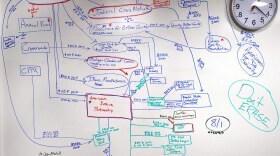
Peter Overby
Peter Overby has covered Washington power, money, and influence since a foresighted NPR editor created the beat in 1994.
Overby has covered scandals involving House Speaker Newt Gingrich, President Bill Clinton, lobbyist Jack Abramoff and others. He tracked the rise of campaign finance regulation as Congress passed campaign finance reform laws, and the rise of deregulation as Citizens United and other Supreme Court decisions rolled those laws back.
During President Trump's first year in office, Overby was on a team of NPR journalists covering conflicts of interest sparked by the Trump family business. He did some of the early investigations of dark money, dissecting a money network that influenced a Michigan judicial election in 2013, and — working with the Center for Investigative Reporting — surfacing below-the-radar attack groups in the 2008 presidential election.
In 2009, Overby co-reported Dollar Politics, a multimedia series on lawmakers, lobbyists and money as the Senate debated the Affordable Care Act. The series received an award for excellence from the Capitol Hill-based Radio and Television Correspondents Association. Earlier, he won an Alfred I. duPont-Columbia University Silver Baton for his coverage of the 2000 elections and 2001 Senate debate on campaign finance reform.
Prior to NPR, Overby was an editor/reporter for Common Cause Magazine, where he shared an Investigative Reporters and Editors award. He worked on daily newspapers for 10 years, and has freelanced for publications ranging from Utne Reader and the Congressional Quarterly Guide To Congress to the Los Angeles Times and Washington Post.
-
The 1,600-page omnibus spending bill includes language that raises contribution limits to the national party committees, bringing them above the realm of merely wealthy donors. Under the provision, donors can give a party a total of $778,000 — each year, an eight-fold increase.
-
Tom Steyer, the hedge-fund billionaire, spent tens of millions of dollars in the midterms, mostly in seven senate and gubernatorial races. Most of his candidates lost, as will — presumably --one of his Steyer's key ambitions: major action on climate change.
-
The 2014 midterm election campaigns are almost over — all $3.7 billion worth of them. Most of that money was spent on television advertising.
-
The Democratic Congressional Campaign Committee is millions of dollars ahead of the Republicans in fundraising, especially among the small-donor faithful.
-
A U.S. Senate seat is up for grabs in Iowa, and the GOP has opened 11 field offices statewide. But there's also a new team working the state, the Virginia-based group Americans for Prosperity.
-
A big week in congressional mailing: Members of Congress can't use "franking" to send mass mailings during a blackout that starts 90 days before an election. That deadline is approaching.
-
Crossroads GPS, the social welfare organization guided by conservative strategist Karl Rove, is practically invisible so far in the midterm political battles.
-
As the U.S. seeks to penalize Russia, the country still has a strong lobbying presence in D.C. How much of a pariah must a nation become before it loses its public presence in the U.S. capital?
-
Tax-exempt social welfare groups have become the vehicle of choice for big political contributions.
-
The reversal of a conservation law court decision to protect Michigan's Au Sable River is an unintended outcome from large donations by anonymous funders funneled through tax-exempt organizations. Known as 501(c)(4)s, these groups are becoming a vehicle of choice for big donors to hide large political donations.




